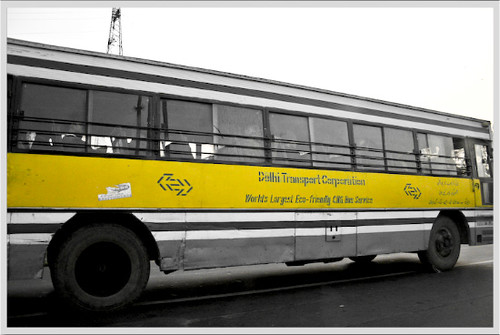
For close to a month now, the newspapers in Delhi have been busy covering the fracas caused by the decision of the government to introduce the Bus Rapid System on a fast track. The intent of the government might have been good; but the experience from the phenomenon proves one thing that of course should have been obvious long ago - that technology is a great too but no panacea. Ultimately technological solutions have to operate in society and society is inhabited by human beings, not robots who will dance to a piper’s tune.
I missing link in the government’s high powered group, the Delhi Integrated Multi-modal Transit System (DIMTS) Delhi Integrated Multi-modal Transit System (DIMTS) has got experience in several fields and has obviously got strong political backing but it does not appear to have thought of including a behavioral psychologist or an anthropologist in its technical team who could have assessed and evaluated the traffic usage pattern in Delhi and offered some recommendations as to whether the BRT would or would not work.

If one looks at the history of the BRT, one finds that it was
“first invented in Curitiba, Brazil in 1974. Other cities that are now using BRT are Bagota Quito, Perreira, Guayaquil, Guatemala City, Los Angeles, Ottawa, Miami, Leeds and Adelaide. Cities like Tokyo, Taipei, Seoul and Lagos have taken up the BRT system now. In India, the system has been partly taken up in Indore, Pune and Ahmedabad, other than Delhi.”
Although the success stories over all seem to be quite a few, and Delhi definitely needs some urgent solution to its traffic woes, simply because a committee containing some scientists of the IIT generate an idea and a group chaired by the Chief Secretary endorses it, it does not mean that it will work. Besides Delhi could have learnt from the experiences of Pune. Pune got the country’s first BRT system, which was implemented one-and-a-half years ago. What was presented as a panacea for Pune’s continuously worsening traffic condition has only worsened the traffic situation there. The much-publicized new traffic mode created major controversy in the first few months of its implementation when the city saw five casualties on the BRT stretch. Lack of awareness about the new system and inadequate traffic sense were the main culprits.
This is not the first time that a traffic project has been handled in such a ham fisted manner. A couple of years ago, the government introduced cycle tracks in many parts of the city, to keep cyclists off the main road. A patch of the road was converted without any fanfare into a cycle track meant exclusively for them. All well except that the cyclists never knew, since no publicity was ever provided. So the cyclists continued cycling where they always had on the main roads; dodging trucks and buses and cars like always.
After a while, with the tracks remaining unused by the cyclists, as was inevitable, the tracks became the haunt of road side motor mechanics who would park their vehicles in the track as they awaited repair. With heavy vehicles routinely using the tracks, soon the tracks were developing potholes and with in less than a year they were no more recognizable as cycle tracks. The scheme was then given a quiet burial but it is understood that with the Commonwealth Games coming up and the government wanting to spruce up the city as best as it can, the cycle tracks are being introduced again. One has to wait and watch if the planning is any better this time round.

The lesson for us in democracy is that sadly the common man who is the most important stakeholder is seldom consulted or his ideas sought for. A bunch of experts sprout up and it does not matter who is in power for each regime has its favorites; these experts practically lay claim to messianic wisdom and come up with “solutions” which the am Aadmi” is not expected to understand and over night it is implemented at a huge cost to the tax payer. Ultimately the issues like the BRT reveal only one thing that democracy is for us Indians only one thing- land up elector’s ID in hand once in five years at the polling booth and then go home and get doped. The benign leaders we elect will look down beatifically and take care of us with the wisdom they alone have.


No comments:
Post a Comment